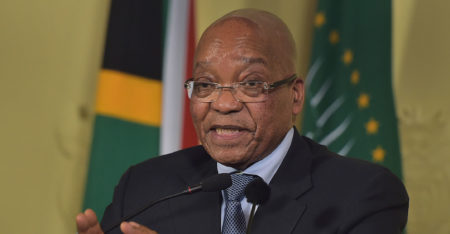
A South African business empire built up by members of the Gupta family is under pressure as they face a mounting backlash over allegations that they exploited their friendship with President Jacob Zuma to loot billions of rand from the state.
Separate reports by the graft ombudsman in November, and the country’s biggest church association and a team of top academics in May, all allege that Atul, Ajay and Rajesh Gupta used their links with Zuma to influence cabinet appointments and secure sweetheart contracts and deals from state companies.
The Daily Maverick news website and the amaBhungane Centre for Investigative Journalism said on 1 June that they have been leaked hundreds of thousands of e-mails said to have been between the family and their employees and business associates that showed how the family and their allies allegedly benefited from undue influence over the government.
Atul Gupta said in a 1 August interview with BBC Radio 4 that the e-mails are “not authentic” and that he was doing “a very, very ethical job”.
South Africa’s four biggest banks shut accounts operated by Gupta-controlled companies last year, due to the perceived risks of being associated with the family, who arrived from India in the 1990s.
In April, the Mumbai-based Bank of Baroda said it would follow suit, potentially leaving the Guptas without banking facilities, according to three people familiar with the matter, and the Johannesburg-based Star reported on 27 July that the accounts would be closed in a month.
Gupta-controlled Oakbay Resources and Energy was forced to delist from the JSE last month after its sponsor and transfer secretary quit. The family says all its dealings were above board and that it’s being victimised by established white business interests.
“The Guptas are being squeezed out of the country in a number of ways,” Mpumelelo Mkhabela, a political analyst at the University of Pretoria’s Centre of Governance Innovation, said in an interview. “They have become untouchable in the sense that no one wants to do business with them now.”
Bell Pottinger
Bell Pottinger, a British PR firm, said in April it no longer represents Oakbay Investments, and last month fired a partner and suspended three other employees after a probe exposed “inappropriate and offensive” activities related to their work for the family, including a social media campaign.
On 18 July, Vitol Group, the world’s largest independent oil trader, walked away from a deal to buy a stake in Africa’s biggest coal terminal from Tegeta Exploration and Resources Ltd., which is part-owned by the Guptas.
Vitol didn’t provide reasons for calling off the acquisition. Calls to Tegeta’s three listed numbers went unanswered. Oakbay referred queries to the Gupta-owned TNA Media unit, whose press office didn’t answer calls or return an e-mail requesting comment.

With Zuma facing a parliamentary no-confidence vote by secret ballot on Tuesday and several high-ranking officials of the governing ANC publicly calling on him to quit, the president’s ability to provide the Guptas and their businesses with political cover is diminishing. Zuma is due to step down as leader of the ANC in December.
In the face of mounting pressure from his own party to halt “state capture”, Zuma has pledged to appoint a commission of inquiry. Lawmakers are planning a separate, wider probe into state capture.
Gary Naidoo, a spokesman for the Guptas, didn’t answer three calls to his mobile phone or respond to two voice messages requesting comment. Presidency spokesman Bongani Ngqulunga didn’t answer three calls seeking comment.
The Guptas first established a computer business in South Africa in the 1990s before amassing stakes in uranium, gold and coal mines, a luxury game lodge, an engineering company, a newspaper and a 24-hour news TV station.
Zuma’s son, Duduzane, has worked with the Guptas for 13 years, initially starting as a 22-year-old trainee at their Sahara Computers business. Publicly available documents show that Duduzane and the Guptas have simultaneously served on the boards of at least 11 companies.
The favouritism the Guptas allegedly enjoyed from state entities was laid out in the graft ombudsman report last year that alleged Brian Molefe, formerly the CEO of electricity utility Eskom, helped them secure a deal to buy Optimum Coal Holdings from Glencore, and awarded them favourable coal contracts.
Molefe and Eskom have disputed the allegations, and public enterprises minister Lynne Brown has ordered an investigation into Eskom contracts for the past 10 years.
Resigned
Molefe resigned as CEO soon after the November report was released, and was forced by the ANC to leave the company again in May after briefly being reappointed. Glencore has declined to comment on the claims.
The leaked e-mails suggest that a Gupta associate allegedly secured R5.3bn in kickbacks from a contract to supply locomotives to the state rail operator Transnet. A big slice of the government’s advertising budget also goes toward the family’s media outlets, according to the opposition Democratic Alliance.
Zuma, his son and the Guptas have denied wrongdoing. While the Guptas said a year ago that they would exit their South African businesses by the end of 2016, “in the best interests of our business, the country and our colleagues” they haven’t followed through.
That announcement was part of a PR exercise and “in no way sincere”, said Darias Jonker, an analyst at Eurasia Group. However, “the e-mail leaks and other circumstantial evidence show that the family has indeed been divesting, in the sense that large sums of money have been moved offshore”, he said.
The Guptas could eventually leave South Africa, said Andre Duvenhage, a politics professor at the University in Potchefstroom.
“The position of the Guptas is extremely difficult,” Duvenhage said. “The tide is constantly going against them. There’s no future for them here.” — Reported by Paul Burkhardt and Mike Cohen, (c) 2017 Bloomberg LP




